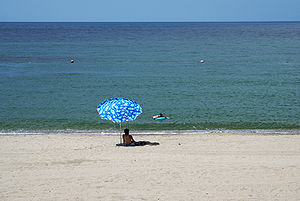
- Image via Wikipedia
Sun has been rehabilitated. It isn’t the great killer you thought it was. In fact, despite 40 years of contrary messages from the dermatological society, it helps protect you from cancer. And more important, sunlight is the main way we humans get Vitamin D, the lifesaving hormone that is used to prevent cancer, heart disease, MS, diabetes, fibromyalgia, osteomalacia and rickets.
We make the Vitamin D in oils on our skin when the sun is directly overhead. That means you don’t want to block the sun then, or to wash it off. A SPF15 sunscreen blocks 99% of all vitamin D production. And it is usually filled with chemicals, nanoparticles and other things you don’t want to absorb through your largest organ. Most sunscreens have avobenzone, benzphenone, ethoxycinnamate, PABA and similar chemicals that are known free radical generators and believed to damage DNA or lead to cancers. They often contain phthalates which are endocrine disruptors.
But you don’t want to burn, because that IS as dangerous as your dermatologist says. So what to do?
- The Vitamin D is made between 11 and 1:00, or when your shadow is shorter than you are. In the south you have a longer time than the north. Before that time, if you are out, cover your skin with clothing.
- Don’t wear makeup, even mineral makeup, because virtually all of them have a skin protection factor that blocks the sun. Ditto the daytime moisturizers. Use a night cream or a pure oil like coconut or sesame oils to moisturize. Yes, you can wear eye makeup if you feel unglamorous without foundation. And if enough skin is exposed to get your Vitamin D, you can protect your face.
- Remove the clothing when your shadow gets short. Spend 10-20 minutes in the sun, not enough to tan or burn, but enough to slightly pink up. If you have dark skin you may need three times as long to get enough Vitamin D. The same goes if you block more than 40% of your skin with clothing. But don’t try to get it all on the first day.
- At this point you can use a safe natural sunblock, or rely upon clothing to cover your skin. Find one with zinc oxide or a similar barrier in a natural oil. You do NOT want to get burned. And yes, you can put on your makeup now.
- If you are getting your sun on a city street, be aware that the angle of the sun may be cut off by tall buildings, reducing your Vitamin D production to high noon.
- If you are swimming at the beach, don’t immediately wash off the salt water. Let your skin absorb trace minerals while it makes the Vitamin D. The longer you go without rinsing the skin exposed for making Vitamin D, the more you will make.
- Wash with water only in the exposed areas. You can wash under your arms, around your groin and skin folds with some soap, but try to keep it from dripping on your legs and arms. Keep the soap off for 48 hours.
- If your hair is frizzy after a day in the sun, you can use a tiny amount of oil, conditioner or a hair masque and rub it through your hair. Shampoo after the 48 hours have passed.
- Your body will not make too much vitamin D. You can overdose on oral vitamin D, although it is really hard, but not from the sun. You can get sunburn on the other hand, and you really do not want to.
- While squamous cell cancer, the most common and most easily removed cancer is more prevalent with sun exposure, malignant melanoma usually occurs in areas hidden from the sun and is more common in indoor workers than outdoor workers. The rest of the cancers, the ones that can kill you, have lower incidence rates and recurrence rates if the blood level of Vitamin D is over 50ng/ml, which shows “high” in most lab reference ranges, but is the preferred base level according to the new research.
- Enjoy your summer. You are building up your Vitamin D reserves to take you through the winter. And getting other inputs from colors in the light spectrum that we usually miss indoors. So get some sun before you block it.
See Related Posts:
Vitamin D Regulates the Immune System
Nursing Mothers, Infants and Vitamin D
How to Get Vitamin D from the Sun
And More On Vitamin D
Vitamin D Prevents Cancer, Type 1 Diabetes, MS, Heart Attack and Pain
Related articles by Zemanta
- Vitamin D (bendbulletin.com)
- Summer Survival Kit (mercola.com)



Yes, see the About Me page.